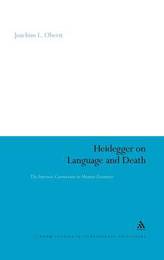
|
Heidegger on Language and Death: The Intrinsic Connection in Human Existence
Hardback
Main Details
Description
Martin Heidegger was one of the most influential philosophers of the 20th century. His analysis of human existence proves an inexhaustible ground for thinkers of all backgrounds who seek answers for their specific questions left open or opened up by our times. This book explores the intrinsic connection between two fundamentally human traits, language and death. Heidegger addresses each of these traits in depth, without ever explicitly outlining their relationship in a separate theory. However, in a close examination of Heidegger's magnum opus, Being and Time, Joachim L. Oberst uncovers a connection in three basic steps. Ultimately the author argues that the human invention of language is motivated by the drive towards immortality - language emerges from the experience of mortality as a response to it. This is a refreshing look at one of the most challenging and influential philosophers of our times.
Author Biography
Joachim L. Oberst teaches in the Program in Religious Studies and the Department of Foreign Languages and Literatures at the University of New Mexico, USA.
Reviews"Joachim Oberst provides a profound and provocative elucidation of Heidegger's mysterious thinking about the relation between the origin of language and our experience of death. Anyone hoping to understand why so many great Judeo-Christian thinkers found themselves inspired by Heidegger's existential philosophy (and vice versa) will need to read this impressively erudite, deeply challenging, and yet resolutely edifying book." - Iain Thomson, University of New Mexico, USA
|